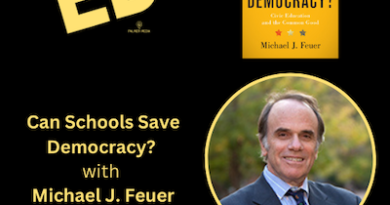Dr. Fathali Moghaddam is a professor in the Department of Psychology at Georgetown University and a faculty fellow at the Berkley Center. His expertise includes culture and intergroup conflict, with a particular focus on the psychology of globalization, radicalization, human rights and duties, and terrorism. You can learn more about his work here.
Fathali joins host Mike Palmer on this episode and begins by sharing how his work as an Iranian-born social psychologist was transformed by the revolution and hostage situation in Iran in 1979. He tells how he drove to Tehran from England and spent the ensuing years studying social psychology within the regime of Khomeini. There he learned of the contexts in which dictators can assume power and this has been a strand of his research ever since.
We explore his belief that it is the role of educators to ensure we protect and nurture democracy by developing psychological citizens. In a wide-ranging conversation touching on the themes and seminal works of Dr. Moghaddam’s career, we also hear what drove him to write his latest book about Shakespeare and the importance of extending beyond narrow specializations to adopt broader, more interdisciplinary mindsets. We conclude with notes on the current state of higher education and the psychology of bureaucracy.
It’s a profound and insightful conversation that you won’t want to miss. Subscribe to Trending in Education wherever you get your podcasts. Visit us at TrendinginEd.com for more great shows like this!
6673220
{6673220:QBEMJYW9}
1
apa
50
default
1409
https://trendingineducation.com/wp-content/plugins/zotpress/
%7B%22status%22%3A%22success%22%2C%22updateneeded%22%3Afalse%2C%22instance%22%3Afalse%2C%22meta%22%3A%7B%22request_last%22%3A0%2C%22request_next%22%3A0%2C%22used_cache%22%3Atrue%7D%2C%22data%22%3A%5B%7B%22key%22%3A%22QBEMJYW9%22%2C%22library%22%3A%7B%22id%22%3A6673220%7D%2C%22meta%22%3A%7B%22creatorSummary%22%3A%22Moghaddam%22%2C%22parsedDate%22%3A%222021-06-10%22%2C%22numChildren%22%3A1%7D%2C%22bib%22%3A%22%3Cdiv%20class%3D%5C%22csl-bib-body%5C%22%20style%3D%5C%22line-height%3A%202%3B%20padding-left%3A%201em%3B%20text-indent%3A-1em%3B%5C%22%3E%5Cn%20%20%3Cdiv%20class%3D%5C%22csl-entry%5C%22%3EMoghaddam%2C%20F.%20M.%20%282021%29.%20%3Ci%3EShakespeare%20and%20the%20Experimental%20Psychologist%3C%5C%2Fi%3E%20%28New%20edition%29.%20Cambridge%20University%20Press.%3C%5C%2Fdiv%3E%5Cn%3C%5C%2Fdiv%3E%22%2C%22data%22%3A%7B%22itemType%22%3A%22book%22%2C%22title%22%3A%22Shakespeare%20and%20the%20Experimental%20Psychologist%22%2C%22creators%22%3A%5B%7B%22creatorType%22%3A%22author%22%2C%22firstName%22%3A%22Fathali%20M.%22%2C%22lastName%22%3A%22Moghaddam%22%7D%5D%2C%22abstractNote%22%3A%22Gain%20a%20better%20understanding%20of%20human%20behavior%20by%20exploring%20thought%20experiments%20in%20Shakespearean%20plays%20and%20the%20historical%20roots%20of%20experimental%20psychology%20within%20early%20modern%20literature.%20This%20book%20combines%20scientific%20psychology%20with%20English%20literature%20to%20discuss%20thought%20experiments%20in%20selected%20Shakespeare%20plays%20and%20examine%20the%20central%20role%20of%20thought%20experiments%20in%20the%20natural%20sciences.%20Thought%20experiments%20are%20essential%20for%20progress%20in%20scientific%20research.%20Indeed%2C%20Albert%20Einstein%20and%20a%20number%20of%20other%20leading%20scientists%20relied%20almost%20exclusively%20on%20thought%20experiments.%20Thought%20experiments%20also%20play%20a%20pivotal%20role%20in%20English%20literature%2C%20particularly%20in%20Shakespeare%20plays.%20By%20focussing%20on%20thought%20experiments%20and%20experimental%20psychology%27s%20place%20within%20early%20modern%20English%20literature%2C%20the%20volume%20establishes%20a%20more%20wholistic%20approach%20to%20understanding%20human%20behavior.%22%2C%22date%22%3A%222021-06-10%22%2C%22language%22%3A%22English%22%2C%22ISBN%22%3A%229781108798365%22%2C%22url%22%3A%22%22%2C%22collections%22%3A%5B%22BUDT7K5D%22%5D%2C%22dateModified%22%3A%222021-10-05T03%3A09%3A02Z%22%7D%7D%5D%7D
Moghaddam, F. M. (2021). Shakespeare and the Experimental Psychologist (New edition). Cambridge University Press.



